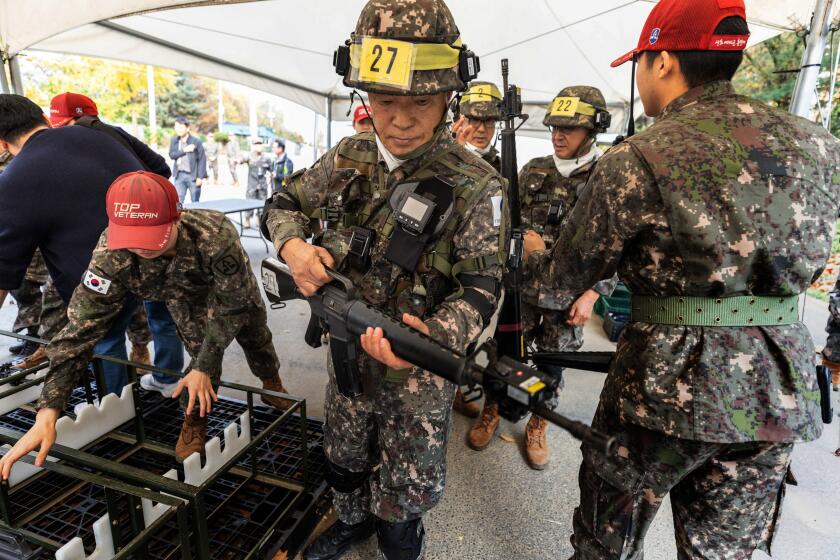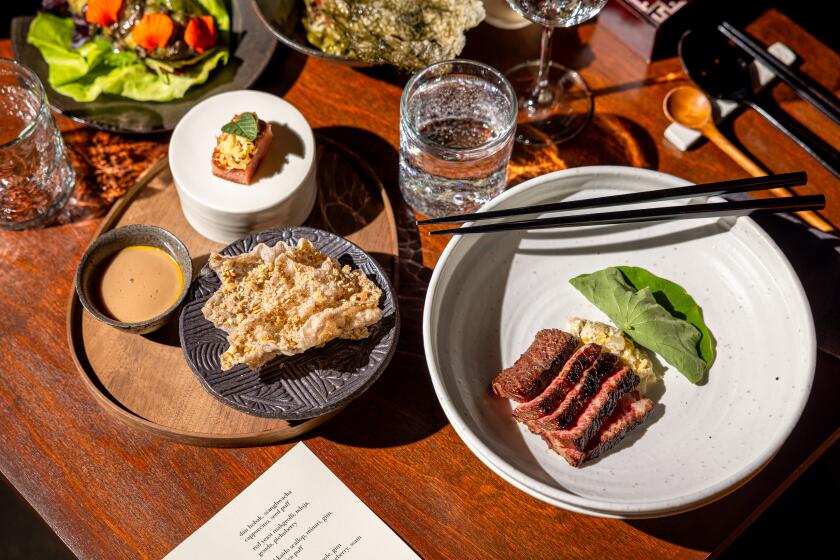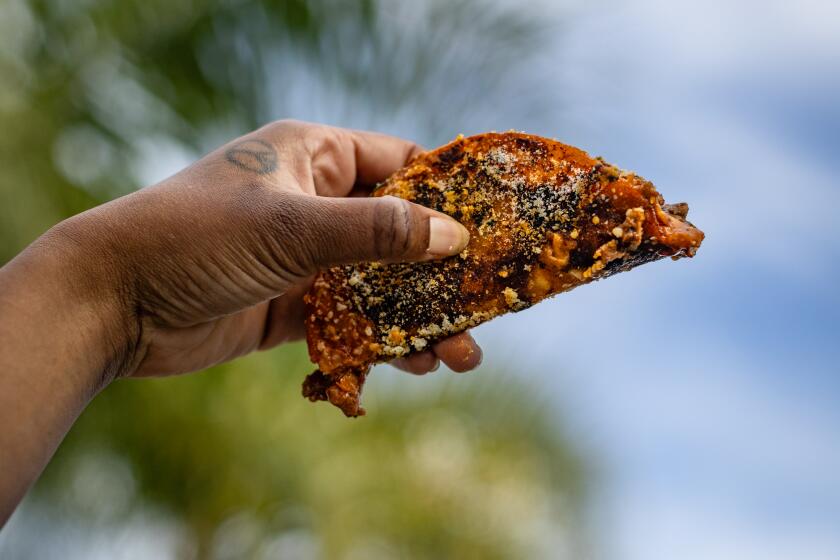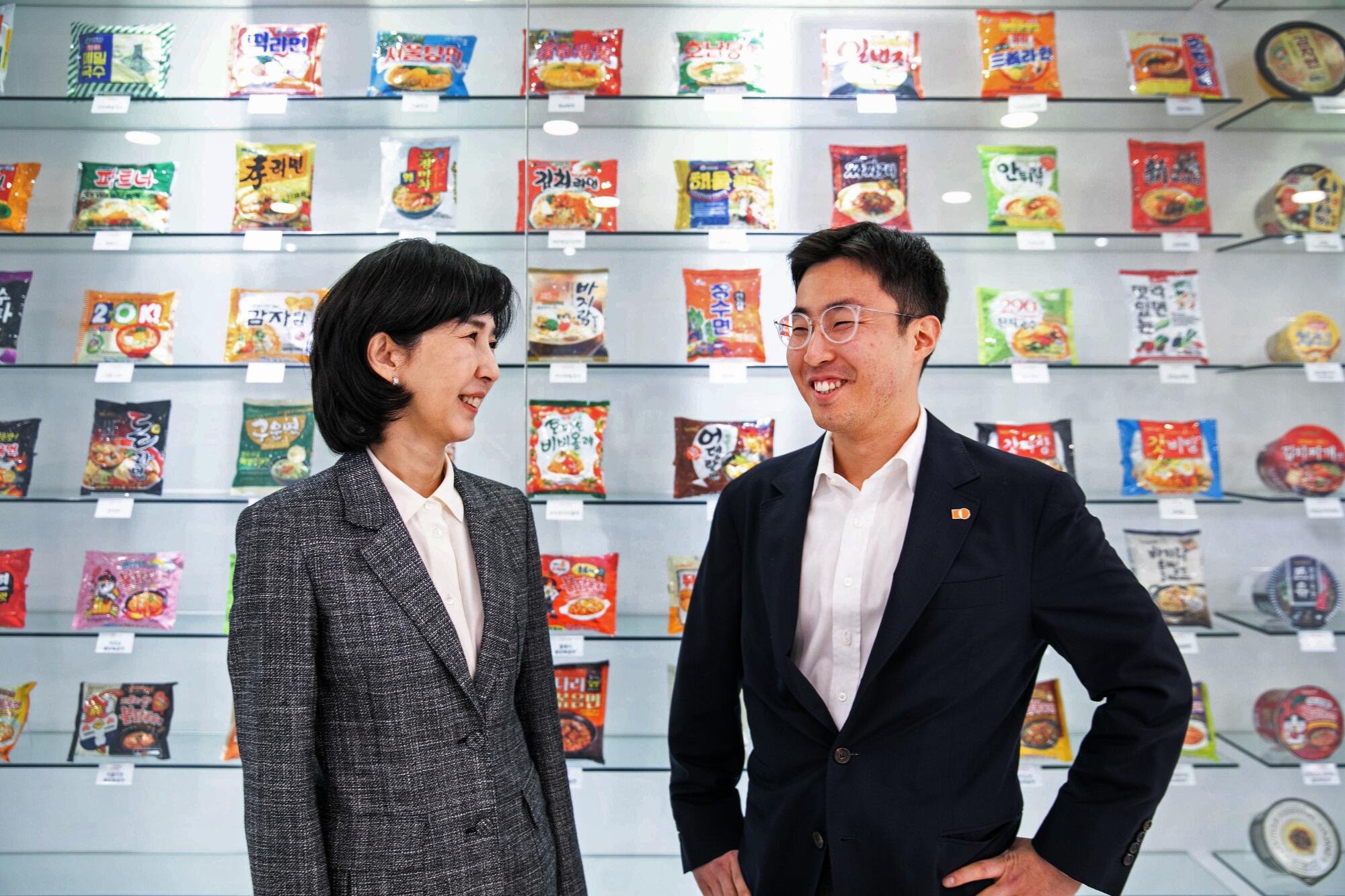
- Share via
SEOUL — In February 2014, a British YouTuber known as the “Korean Englishman” uploaded a video that would change the fate of an instant noodle company halfway across the world.
The video features his friends and family eating a cup of Korean instant noodles against the backdrop of familiar London sights. The noodles, shipped to him by his subscribers, are intensely spicy. The idea is to see if his guests can take the heat.
Among them is the Englishman’s father, whose “really nice” soon turns to “ooh, that’s getting hotter.” Milk is gulped, then shot out the nose. Tongues are wiped. Noodles are flung. The dad takes off his sweater.
The video accumulated 11 million views, but today it is a forgotten online artifact, one of the era’s countless internet challenges.
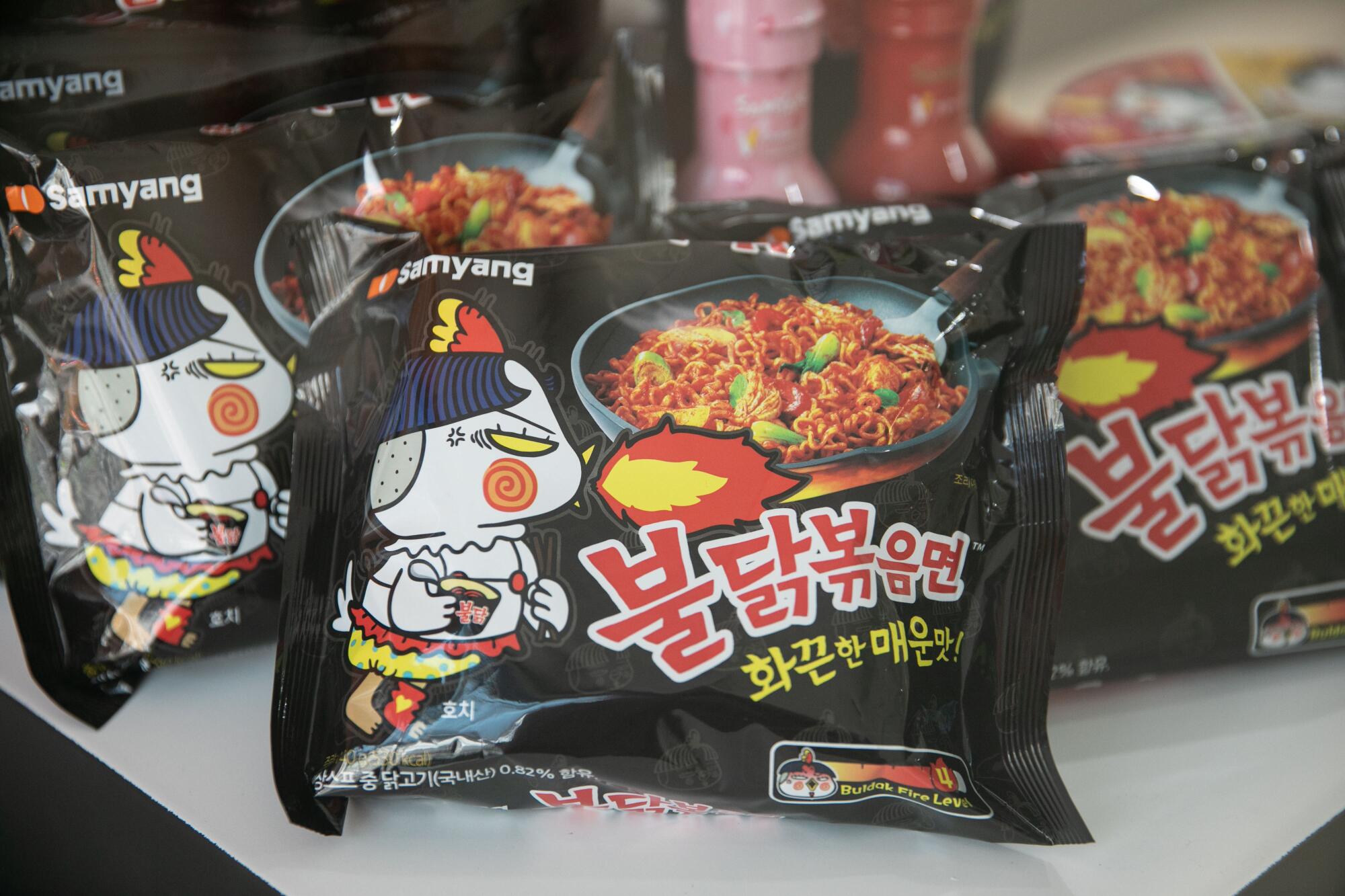
But for Samyang Foods, the family-owned manufacturer of Buldak “fire chicken” ramen and one of South Korea’s most storied noodle brands, the video proved a lifeline that would carry it through both deep financial trouble and self-inflicted scandal.
: :
Despite its Japanese origins, instant ramen is often said to be South Korea’s soul food.
In the period of breakneck industrialization that began in the 1960s, it fed factory laborers who had left their farms for the cities. In the 1980s, ramen was the fuel of pro-democracy activists who toppled decades of military rule.
In 2016, after a 19-year-old mechanic was killed by an arriving train while repairing a sliding door at Seoul’s Guui Station, the unopened noodles found in his bag became a metaphor for the welfare of the country’s most vulnerable workers.
With South Korea’s birthrate plummeting, veterans in their 60s and 70s say they can bolster the army’s ranks. But can they keep up with the young?
“My heart still hurts when I think of that lone packet of cup ramen sitting in your bag,” read one of the many tributes left at the site of the accident, along with packets of instant noodles. “I hope for a world where safety, life and humans will come before efficiency and profits.”
Ramen can be breakfast, lunch or dinner, prepared at home or ordered at restaurants in elevated form, like loaded nachos. Some Koreans pack ramen in their suitcases before traveling overseas, as a spicy palate-cleanser for countries where local cuisines are comparatively bland or brothless.
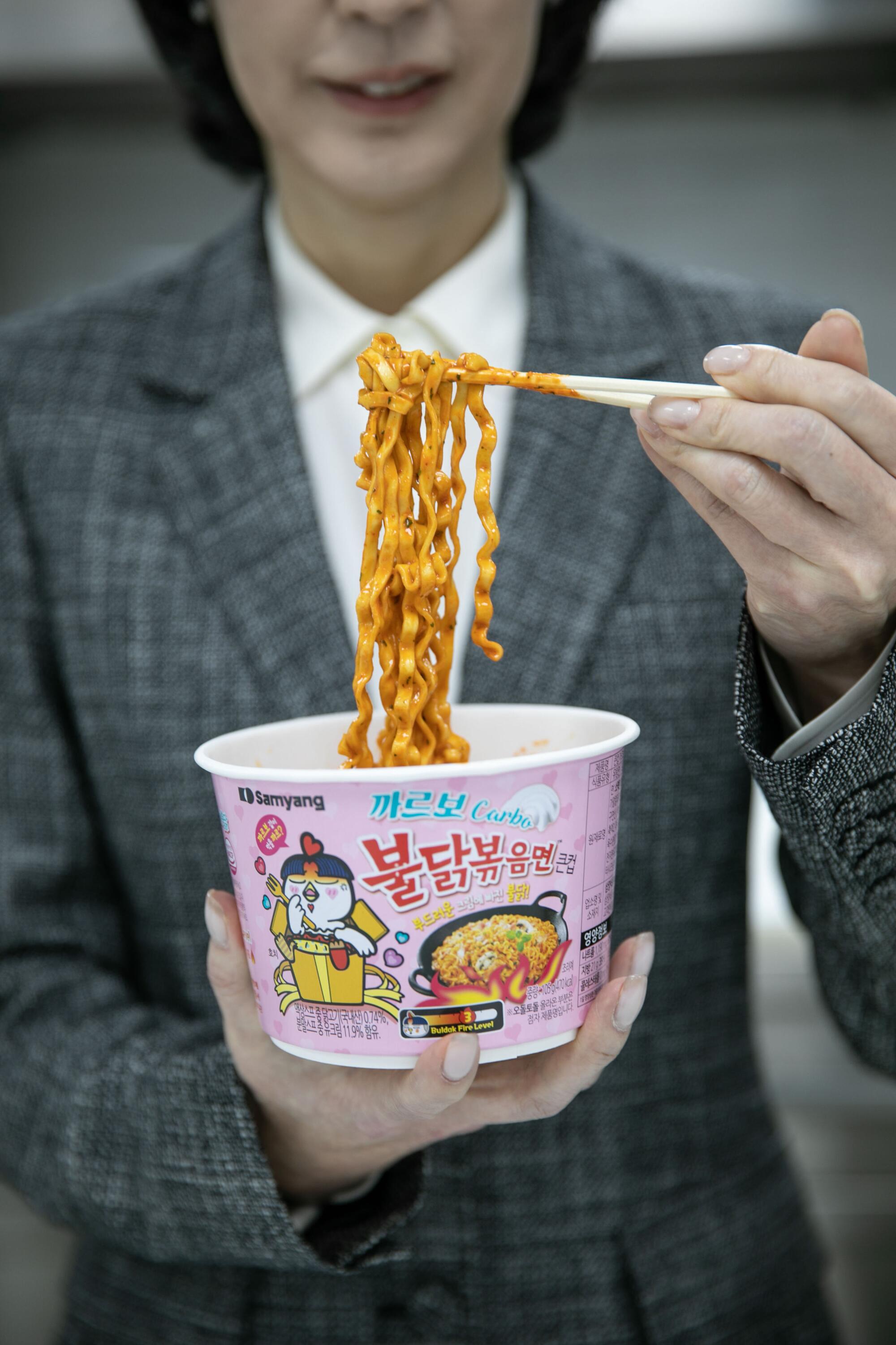
“Do you want to come in for some ramen?” is a euphemism for bedroom romance, like “Netflix and chill.” Park Chan-ho, a former Dodger and the first South Korean player in Major League Baseball, once said in an interview that he picked up the sport because he wanted to eat ramen, a perk reserved for his school’s baseball team.
Today, South Koreans consume an average of 77 instant noodle servings a year, second only to Vietnam, at 85, and far above the United States, at 15, according to the World Instant Noodle Assn.
All of this began with Samyang Foods, founded in 1961 by Chun Joong-yoon, a former insurance company executive, amid severe postwar food shortages. After witnessing his countrymen lining up to eat a stew made from leftovers from U.S. Army bases, Chun came to believe that instant noodles could be the solution.
At around 10 cents a serving, Samyang’s first product — a chicken-flavored noodle — was cheaper than a cup of coffee, making it a crucial alternative to rice.
A movie star known for the Oscar-winning ‘Parasite’ got caught up in South Korea’s anti-drug fervor. He maintained his innocence until the end.
President Park Chung-hee, a military dictator who took power in a coup d’etat in 1963, suggested that the company make the broth spicy in order to appeal to Korean palates.
By the 1970s, even as competitors entered the fray, Samyang held a commanding 65% market share and was among the 25 biggest companies in the country. Targeting the Korean diaspora, the company built a factory in Los Angeles in 1984.
Then things began to unravel.
: :
In 1989, an anonymous informant alleged to authorities that Samyang was cooking its noodles in non-food-grade beef fat. The “beef fat affair,” as it is known today, sent the company into a decades-long spiral. Consumers turned their backs; its top food scientists left for competitors.
The allegations turned out to be false. But by the time the company cleared its name in 1997, the Asian financial crisis plunged Samyang into insolvency.
Samyang went into survival mode, spending the next decade paying back its debts to the bank, which held the company’s shares as collateral. The L.A. factory was shuttered. And while other companies began to digitize operations, Samyang’s employees did their books in longhand.
The tasting menu at Baroo 2.0 is worlds apart from the madcap grain bowls Kwang Uh created at the original restaurant. But his maturing style still shows a wild streak.
Then, in the spring of 2010, Chun’s daughter-in-law Kim Jung-soo was eating lunch at a restaurant that served a spicy chicken stir-fry dish when she noticed people sweating and fanning their tongues, assailed by both pleasure and pain.
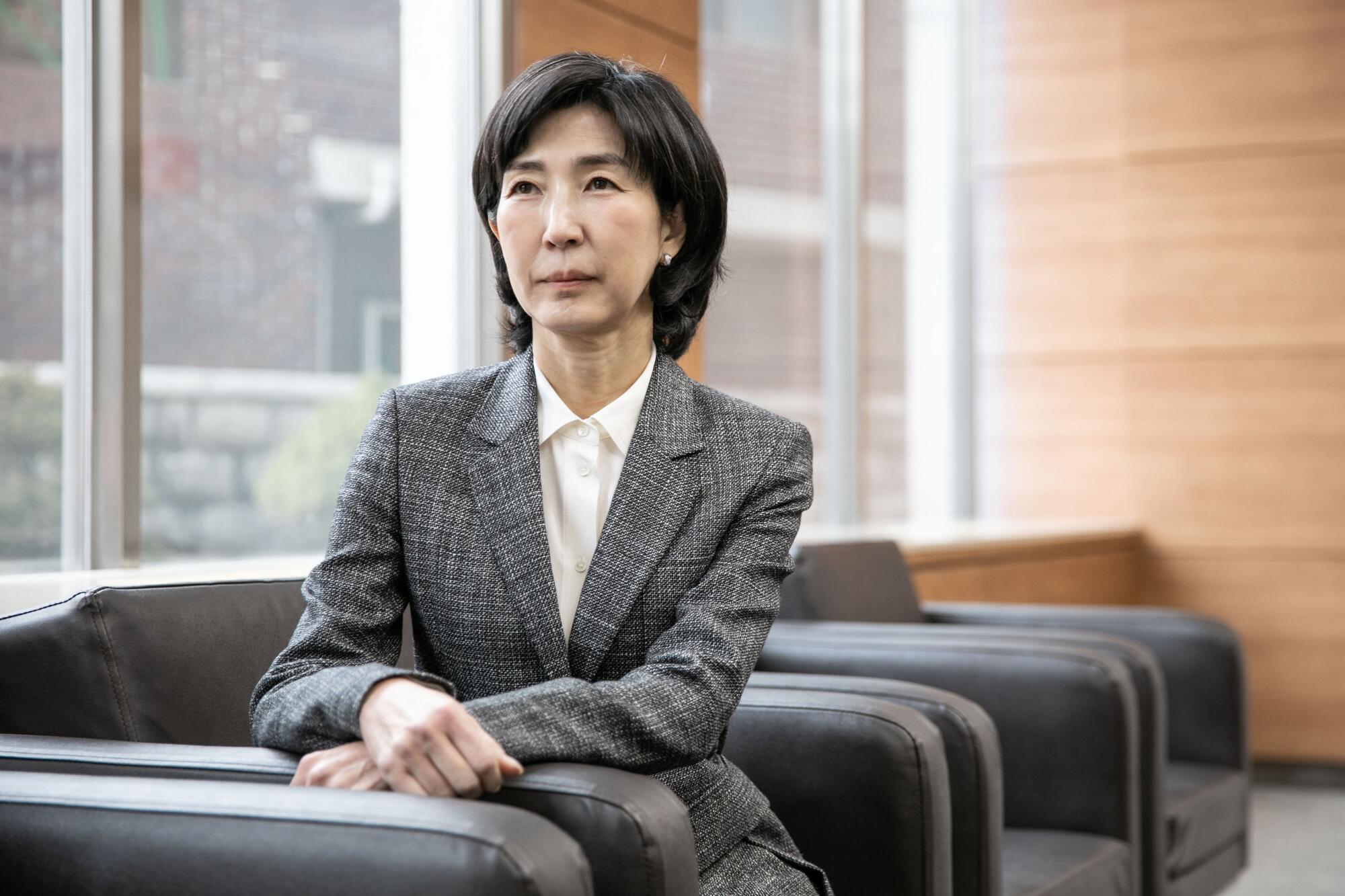
“All I was ever thinking about was ramen, even back then,” Kim said. “So my natural thought was: Why not turn this into a product?”
Kim, who had married into the family in 1994, was a homemaker before starting in the Samyang sales department in 1998 at the request of her father-in-law.
“He seemed to think that because we’re in the business of food, a woman’s more exacting perspective might be useful,” Kim said, “and that if a member of the family went to look after things in person, it would set a good example for the employees.”
When Samyang’s food scientists brought her prototypes for Buldak, she repeatedly ordered them to up the heat.
“My reaction?” said Lee Byung-hoon, the company’s chief food scientist. “It was, ‘She’s actually going to sell this?’”
When Buldak went to market in 2012, it seemed like a flop.
“The feedback from the retailers and consumers wasn’t very good,” Kim recalled. “It was too spicy.”
But the 2014 YouTube video set off a welter of “fire noodle challenges” around the world, launching Buldak into viral fame. In a video that has amassed 145 million views, American competitive eater Matt Stonie ate 15 servings.
Sales — especially exports — began to grow.
: :
Given the unique place of ramen in the country’s history, Samyang’s pride as a family-run business runs deep.
Like many South Korean family-run enterprises, including Hyundai and LG, the company follows the rules of dynastic succession, with management passed down to the firstborn son.
Kim’s husband, Chun In-jang, who took over the company in 2010, started a brick-and-mortar noodle shop and a burger franchise, among other ventures. None of them worked.
For many Asian Americans, K-pop is a big part of their identity and how they live.
Buldak countered those losses and more.
Its popularity was buoyed by the rise of other global Korean phenoms like the boy band BTS — whose member Jimin is a known Buldak-lover — and the Oscar-winning film “Parasite,” which featured a viral ramen scene.
Then, in 2020, Chun and Kim were found guilty of embezzling $3.7 million from the company. The court found that they had used the cash to pay for home renovations, car leases and credit card bills. Chun was sent to jail, while Kim was given a suspended sentence. They returned the cash.
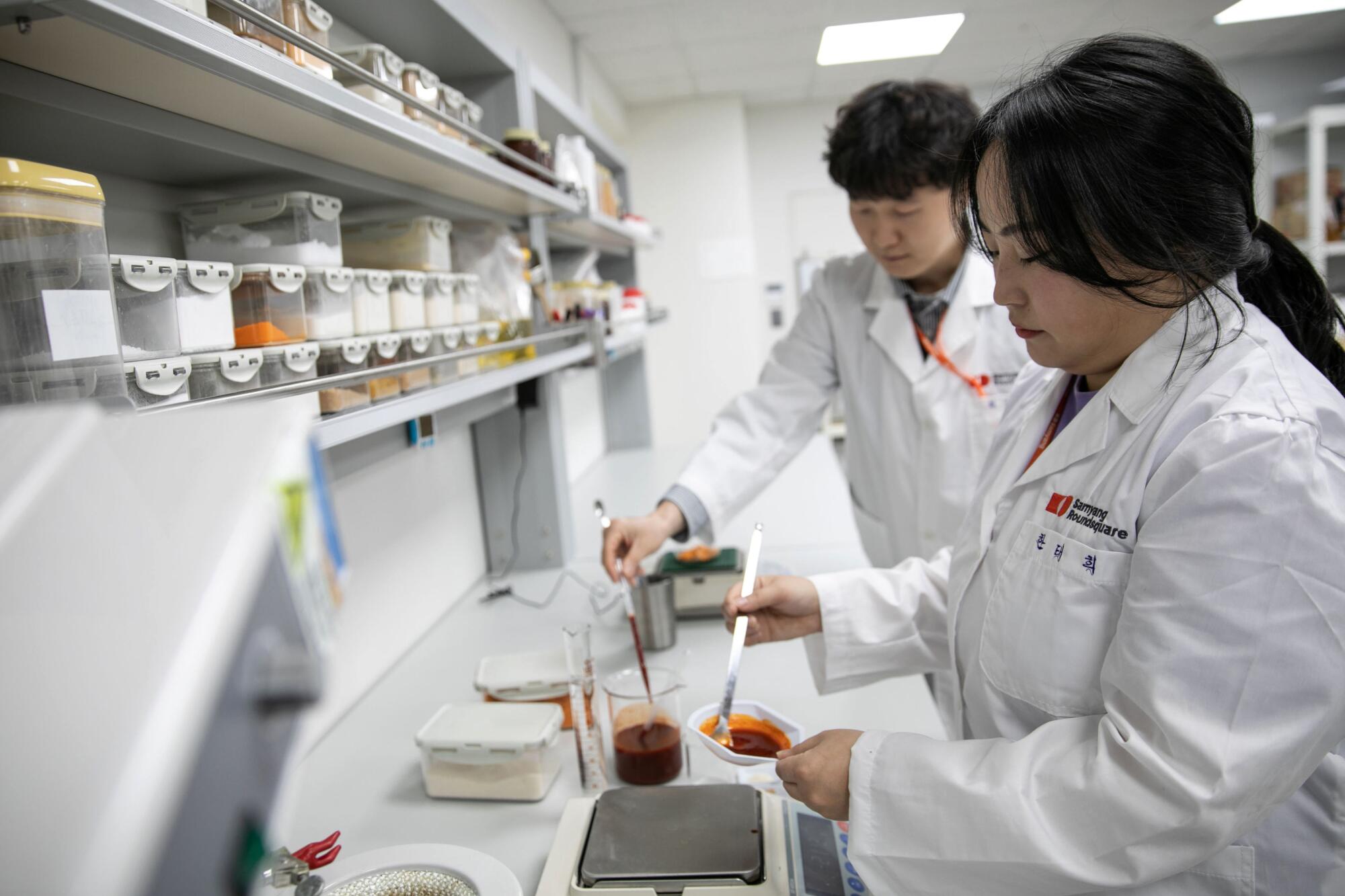
The case cast a shadow over Buldak’s success, serving as a reminder of the inherent risks of family ownership of public companies, a tradition that has come under increasing scrutiny.
Though credited with driving South Korea’s economic growth in years past, family-run conglomerates have frequently been at the center of scandals. Heirs have been accused of using company coffers like their personal piggy banks.
Well-credentialed but inexperienced young scions have proved to be lackluster executives, like one department store franchise heir whose track record of unprofitable ventures has earned him the nickname “the Hand of Minus” — a play on King Midas.
Chun’s career ended with the embezzlement scandal. But Kim, despite fierce shareholder backlash, received a government pardon and returned to the company, becoming chief executive in 2021.
“It was a painful lesson that I have taken to heart,” said Kim, 59. “My focus now is rallying myself to do better and producing results that will speak for themselves.”
: :
In the South Korean ramen industry, which has more than 500 products on the market, standouts like Buldak are rare.
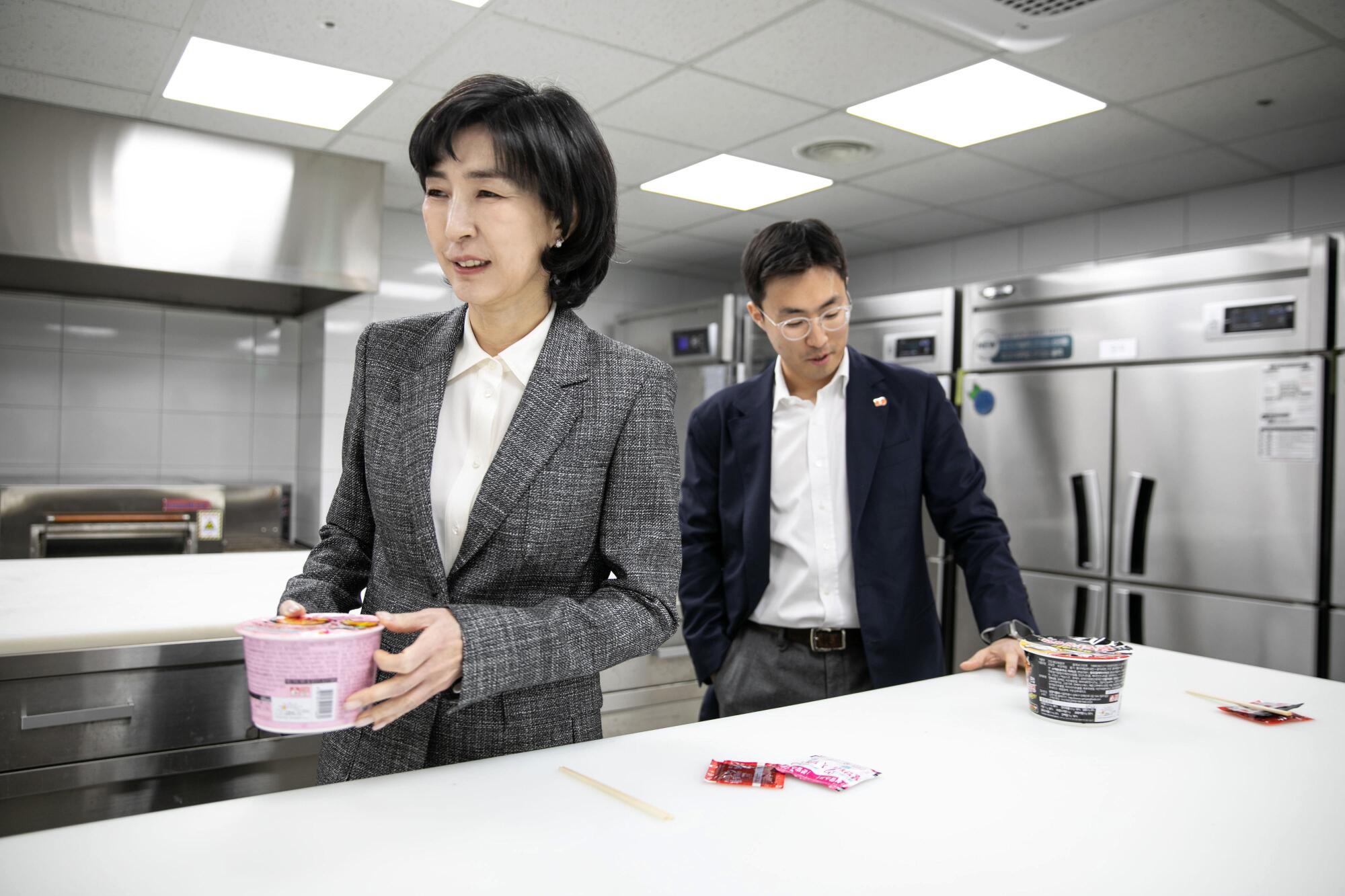
It has driven Samyang’s revenue from $224 million in 2015 to $893 million in 2023. With a tenfold increase in its stock price, the company has regained ground on its two larger rivals. Buldak knock-offs have been spotted in North Korea.
Around 75% of the company’s revenue comes from overseas sales, compared with 10% in 2015. In the United States, where Buldak is on the shelves of Walmart and Costco, the company is considering opening a factory again.
‘Ramdon’ or jjapaguri: Why Bong Joon Ho added steak to a popular South Korean dish in ‘Parasite.’
As rising living costs continue to drive up instant noodle consumption across the world, Samyang now accounts for roughly two thirds of exports of the product out of South Korea, which hit a record $952 million last year.
More than anything, Kim sees Buldak as a “gift from the heavens” that has returned the legacy of Korean ramen to her family’s hands.
The question now is whether that legacy can continue in the hands of her 29-year-old son, Jeffrey Chun, who is being groomed to take over.
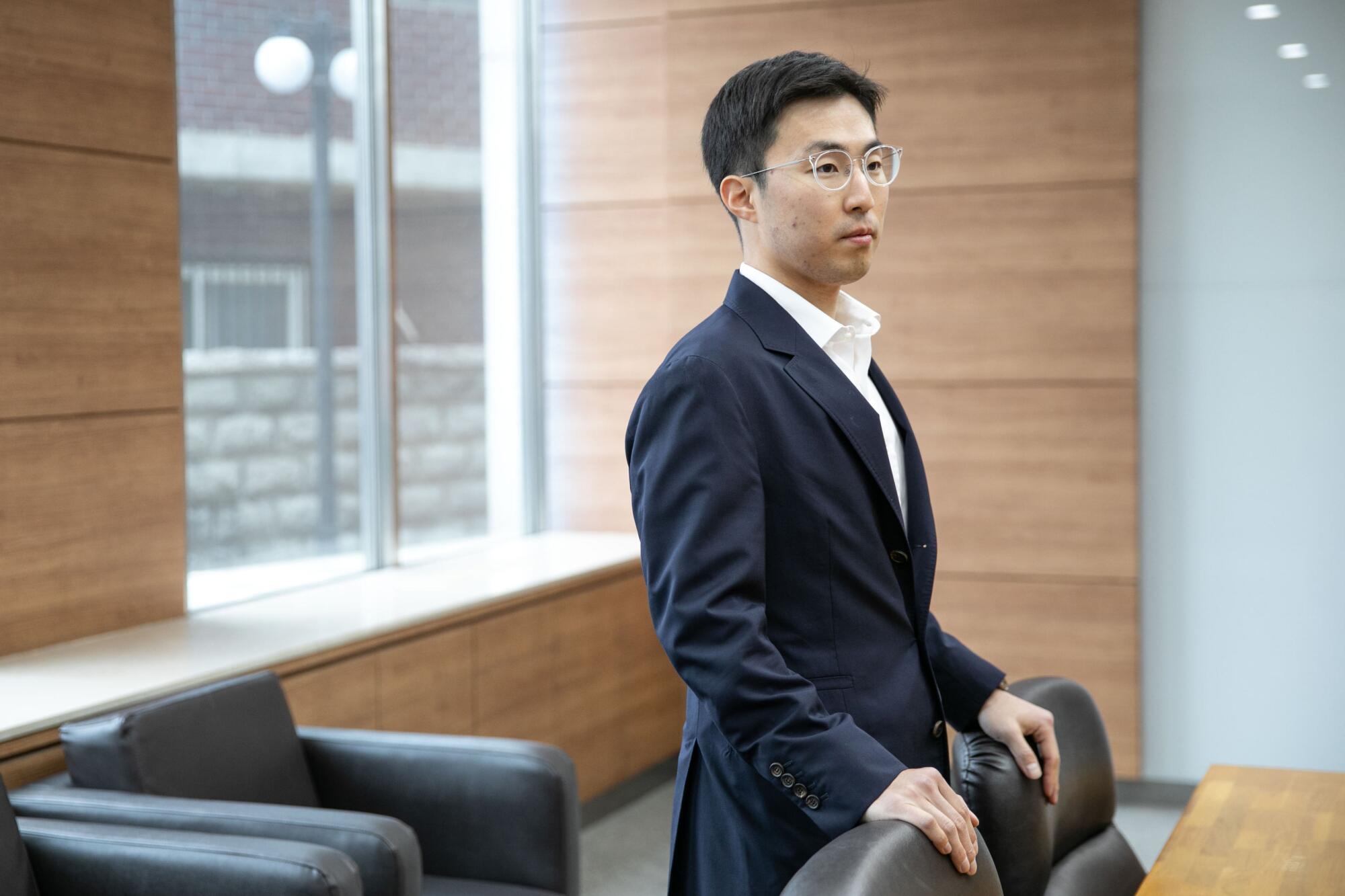
Chun joined the family business in 2019, straight after graduating with a degree in philosophy from Columbia University, where he wrote his senior thesis on Aristotelian ethics.
“A part of me always knew that I had to join the company, although it wasn’t always clear to me,” he said.
Since then, as is common for corporate scions, he has been fast-tracked up the ranks. He was appointed junior vice president last year, reportedly making him the youngest executive in the South Korean food industry.
After the company’s 60th anniversary ceremony last year, where Chun made his first public appearance as heir, headlines questioned whether he would overcome his “father’s failures” or live up to his mother’s success.
Chae Sang-wook, a former stock market analyst who has covered South Korea’s family-run conglomerates, said the current group of heirs has not inspired confidence: “If the earlier generation was known for misconduct like embezzlement, the current generation is seen as prone to making questionable business decisions.”
Chun has been tasked with transforming Buldak from a fun Korean novelty to a food genre of its own.
“The question I ask a lot of people is: ‘How would you describe the flavor of Coca-Cola?’” he said. “The answer is often that it just tastes like Coke.”
From food trucks to soul food restaurants, here’s how Black chefs are putting their spin on tacos in Los Angeles.
Chun calls his strategy “eatertainment” — a portmanteau of “eat” and “entertainment” that captures his desire to replicate Buldak’s original viral moment.
The effort currently consists of a YouTube channel called “Play Buldak TV” that features videos of hired actors playing branded games that include Buldak Bingo, Buldak Roulette and — in a spin on a fraternity basement classic — Buldak Pong.
Chae is skeptical of the idea that virality can be engineered.
“A big part of Buldak’s success on YouTube came down to plain luck,” he said. “And it’s impossible to systemize luck.”
More to Read
Sign up for Essential California
The most important California stories and recommendations in your inbox every morning.
You may occasionally receive promotional content from the Los Angeles Times.
